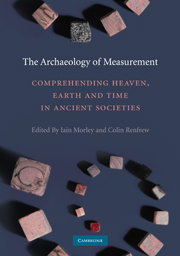Book contents
- Frontmatter
- Contents
- List of figures and tables
- List of contributors
- Acknowledgements
- The Archaeology of Measurement
- Introduction: Measure: Towards the construction of our world
- SECTION I NUMBER: COUNTING, MATHEMATICS AND MEASURE
- SECTION II MATERIALISING THE ECONOMY
- SECTION III DIMENSIONS AND BELIEF
- SECTION IV CALENDAR AND COSMOLOGY
- SECTION V THE SPIRITUALITY OF MEASURE
- 19 The roots of spirituality and the limits of human mensuration
- 20 Worldview, measurement and ‘the roots of spirituality’
- Index
- References
20 - Worldview, measurement and ‘the roots of spirituality’
Published online by Cambridge University Press: 05 June 2012
- Frontmatter
- Contents
- List of figures and tables
- List of contributors
- Acknowledgements
- The Archaeology of Measurement
- Introduction: Measure: Towards the construction of our world
- SECTION I NUMBER: COUNTING, MATHEMATICS AND MEASURE
- SECTION II MATERIALISING THE ECONOMY
- SECTION III DIMENSIONS AND BELIEF
- SECTION IV CALENDAR AND COSMOLOGY
- SECTION V THE SPIRITUALITY OF MEASURE
- 19 The roots of spirituality and the limits of human mensuration
- 20 Worldview, measurement and ‘the roots of spirituality’
- Index
- References
Summary
It is sometimes said that in interdisciplinary conversation, “iron sharpens iron”. When those trained in different intellectual pursuits meet for serious discussion, the result is often a sharpening of insight with respect to their own particular field, as well as a clearer perception of another. I was asked as a professional theologian to engage with the material in these chapters (and to take part in the symposium that led to them) with an eye to the Templeton Foundation's enquiry into ‘the roots of spirituality’ – the origins of religious belief and practice. The following is offered in the hope that, just as I gained an enormous amount from being plunged into the world of archaeology, those at work in that world might find it useful to consider their findings from the perspective of someone at work in the world of religion and ‘spirituality’.
It is far beyond the scope of a single chapter even to outline the various connections between religion and the material in these fascinating contributions. What I attempt here is something much more modest: to highlight some of the basic issues implied in any enquiry into the ‘religious’ or ‘spiritual’ dimensions of human behaviour, not least when the attempt is made to trace the links between archaeological data and religious activity. Especially illuminating in this respect, I am going to suggest, is the concept of ‘worldview’.
- Type
- Chapter
- Information
- The Archaeology of MeasurementComprehending Heaven, Earth and Time in Ancient Societies, pp. 250 - 256Publisher: Cambridge University PressPrint publication year: 2010
References
- 1
- Cited by



